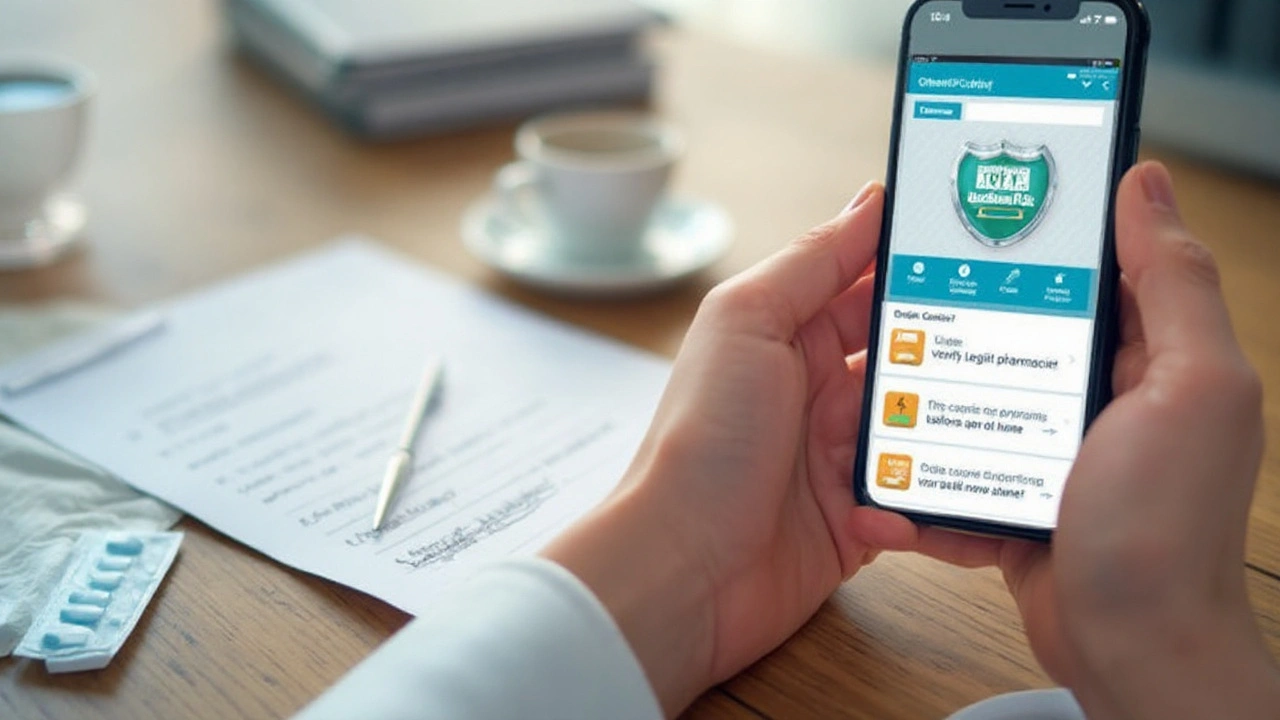Standing in line at a pharmacy, hoping they have what you need, can be stressful—especially when that medication is Combivir. This isn’t your usual painkiller. We’re talking about a critical HIV treatment. For so many, ordering online feels faster, more discreet, and sometimes more affordable. But here’s the catch: how do you know if what you’re getting is legit or if you could be risking your health on a fake pill? Today, I’ll walk you through all the twists and turns of the online Combivir market—what works, what’s risky, and how to not get burned. The stakes are high, but you can outsmart the vultures once you know what to watch for.
What Is Combivir and Why Getting It Online Matters
Let’s unpack why buy Combivir online even comes up so much in forums and support groups. Combivir is the real deal for people living with HIV—it’s a combo of two antiretrovirals, lamivudine and zidovudine, in a single tablet. This makes daily treatment simpler. Taken regularly, it helps prevent the virus from multiplying and dropping those all-important viral load numbers. If you’re reading this, chances are you or someone close needs this medicine—and not as a maybe, but as a must-have.
Now, say you’re traveling or you live rural, far from the nearest HIV treatment center. What do you do? Maybe your regular pharmacy can’t get it fast enough, or prices are sky-high. That’s where online pharmacies enter the scene. You’ve probably noticed that the internet is full of offers for prescription drugs—some look pro, others scream scam. And with Combivir, the risks spike: getting the wrong medicine or the wrong dose isn’t just inconvenient, it’s dangerous. Counterfeit HIV meds have popped up way too often. The World Health Organization once estimated that up to 1 in 10 medications in low- and middle-income countries are fake. Scary stuff, right?
There are perks to buying online besides just ease of access. One is privacy. Not everyone wants to have their face known at the local chemist every time they need a refill—especially when it comes to HIV medications, thanks to the relentless stigma in some communities. Then there’s the matter of price. Legit online pharmacies, especially those based abroad, sometimes sell meds for less than local outlets. But the flip side is the growing swarm of knock-offs and unregulated sellers. It’s a wild west, so understanding what to look for before you click “Buy Now” is a survival skill.
It also matters where you live. In the US, Combivir is prescription-only, and it’s not cheap without insurance. In other countries, you may find different versions or generics. But U.S. buyers should stay away from any online source offering to ship prescription Combivir without a valid doctor’s order—that’s an instant red flag. Always. Even the best online pharmacy can’t waive national laws.
Convenience, privacy, and maybe even a better price—these draw people online. But remember: the risks are different when you’re buying a daily life-saving med, compared to a bottle of aspirin. The trick isn’t to stay away from the internet, but to get savvier about the sources and the systems behind them.

How to Spot a Legit Online Pharmacy for Combivir
Finding an online pharmacy that sells real Combivir is not as straightforward as a quick Google search. There’s a whole dance you have to do to sort out the trusted from the trap. Let's go through what to check before you ever pull out your credit card.
- Check for certification: In the U.S., look for the VIPPS seal from the National Association of Boards of Pharmacy. This tells you the pharmacy meets high safety and privacy standards. If you’re elsewhere, check what regulatory body covers online meds in your country and see if the site is registered.
- Requires a valid prescription: Any pharmacy willing to sell you Combivir without one should go straight in the bin. These places are breaking the law, and if they're shady about scripts, they’re probably dodgy about quality too.
- Contact information is clear: Real pharmacies have a phone number, email, or a chat option—and yes, someone should answer. Test it! If you only see a vague email form or nothing at all, keep your guard up.
- Check the pharmacist: Legit sites list licensed pharmacists and their credentials. If you see no mention of real people or no way to speak to a pharmacist, that’s fishy.
- Look up reviews—carefully: Third-party review sites like Trustpilot can be useful, but don’t fall for fake 5-star ratings that all sound the same. Check HIV forums as well. People are brutally honest about good and bad experiences.
- Be cautious with prices: If prices are dramatically lower than what you’ve seen elsewhere, that’s a red alert. Genuine sites may offer slight savings, but they still have to pay for real meds.
It helps to know some go-to names, though the scene shifts. Big, global platforms with strong reputations, like Canada Pharmacy or PharmacyChecker-verified outlets, often do a decent job checking their sources. You might even want to call your own insurance company—many have preferred mail-order or online partners and can verify if the pharmacy is in-network.
One more trick: plug the pharmacy’s website URL into legitimate online verification tools. The National Association of Boards of Pharmacy (nabp.pharmacy) lets you check sites instantly. The FDA’s BeSafeRx campaign is another goldmine of reliable info.
If you’re tempted by international sources, focus on those that actually require a prescription and detail where Combivir is coming from—country of origin, manufacturer, packaging. Steer clear of sites shipping from mystery locations or sending loose pills in unmarked bags. You deserve better than taking chances with your health.
Keep a screenshot or printout of your order confirmation and any correspondence. If the meds don’t arrive, or if the pills look off (broken tablets, weird odors, misspelled labels), stop immediately and contact your doctor and the pharmacy. Taking a gamble with antiretrovirals is not worth the trouble it can bring.

Making the Purchase: Tips, Tricks, and Pitfalls
You’ve found a pharmacy that checks out—but the journey’s not quite over. There are still a few steps that can save you time, money, and stress when buying online.
- Prepare your prescription: Don’t upload this to just any site. Only use a secure, certified platform. Some pharmacies can contact your doctor directly; others will require you to fax or upload your actual prescription. Double-check the process in advance.
- Compare total costs: Add up shipping fees, possible customs charges (especially if ordering across borders), and find out how refills work. Sometimes an upfront deal turns out pricier over time. Ask about insurance eligibility too—many legit pharmacies will process insurance claims if you’re eligible.
- Ask about generic options: Combivir’s patents have ended in several countries. Generic lamivudine/zidovudine tabs work as well as the brand in clinical studies, cost less, and are often just as easy to get online. Make sure the generics come from a recognized, high-quality manufacturer like Mylan or Teva, not some no-name source.
- Check for cold chain needs: Good news—Combivir tablets don’t need refrigeration, but should stay in a dry, room-temperature place. Still, double-check packaging is sealed and professional, not loose or crumbling.
- Plan for shipping delays: Sometimes deliveries get stuck in customs or slowed during holidays. Order ahead. Running out of HIV meds even for a few days is not an option—the virus can rebound fast. Set up calendar reminders for ordering refills at least two weeks before you run low.
Once your package arrives, compare the pills—size, color, imprint—with what you usually get from your local pharmacy. You can pull up photos of approved Combivir and generic options on official drug info sites. If anything is off, or if the packaging looks tampered with, call your doctor. Some pharmacies let you return questionable meds.
It’s not just about scams—mistakes happen even at the best places. Maybe the pharmacy ships the wrong dosage or forgets your prescription tag. Always check your order before you start your new blister pack. If your insurance or co-pay assistance plan covers Combivir, see if you can use those benefits online—the savings can be huge, and sometimes online mail-orders qualify.
Read the fine print on autofill programs. Some online pharmacies will enroll you in an automatic refill system. This is super handy as long as shipping works smoothly, but you need to make sure they don’t keep charging if you want to stop. Keep those confirmation emails handy.
Lots of people say they like the peace of mind from tracking their order online. If live tracking is offered, use it. You’ll know exactly where your meds are and when to expect them.
Here’s a personal tip: join a support group or forum for people living with HIV. Folks share the names of reputable online pharmacies, compare prices in real time, and warn about new scams. You’ll get real advice from people who’ve walked the path and figured out the shortcuts the hard way.
The bottom line, Combivir is too important to leave up to chance. Buying online can be a real blessing when done wisely—saving time, frustration, and sometimes a big chunk of cash. Give yourself permission to ask lots of questions, be picky, and double-check everything. There’s no gold medal for taking risks with your meds, only for sticking around and staying healthy.

Comments (13)
L Taylor
August 16, 2025 AT 13:44
Buying meds online is a decision of consequence, so shop like your life depends on it because sometimes it literally does.
Look for verifiable seals, keep receipts, and never trust a site that hides its pharmacist info or ships pills in loose plastic.
Stick to certified services, save screenshots, and set calendar reminders so you never run low.
Nancy Chen
August 17, 2025 AT 16:13
Fake pills are out there and they are ugly - stay sharp.
rajendra kanoujiya
August 18, 2025 AT 21:23
Most people hyping international sellers forget that generics from reputable manufacturers are fine, the problem is the mystery suppliers not the country of origin.
If it's cheap because it's generic and the maker is known, that's different from cheap because it's anonymous.
Caley Ross
August 20, 2025 AT 02:33
Simple tip that helps: order at least two weeks ahead every refill and use tracked shipping only.
No tracking, no trust, end of story.
Bobby Hartono
August 21, 2025 AT 09:06
There are layers to this that people often skip over, and it's worth mapping them out so other folks can avoid headaches and real danger.
First, the prescription requirement isn't just bureaucratic red tape it exists to ensure a clinician is verifying that the drug, dose, and combination are appropriate for the person who will take them and that's crucial for HIV meds where adherence and correct dosing drive outcomes.
Second, while price pressures are real and can push people toward risky vendors, there are several verified mail-order pharmacies and patient assistance programs that reduce cost without putting quality at risk and it's worth spending time to find those rather than grabbing bargain listings that look too good to be true.
Third, packaging and pill identification matter a lot more than most expect; comparing imprints, colors, and blister layout with official references can catch many counterfeits before they are used and that small habit can save a lot of trouble down the line.
Fourth, community forums and support groups are practical gold mines for real-world pharmacy recommendations and shipping experiences and joining one is a small step that pays off in actionable intelligence.
Fifth, if someone is switching between brand name and generic, they should let their prescriber know because check-ins after a switch help ensure there are no unexpected tolerability or adherence issues and this communication is part of safe online purchasing.
Sixth, keep an organized digital file of prescriptions, receipts, and communication with the pharmacy because having a paper trail speeds resolution if something goes wrong with shipping or quality.
Seventh, understand your country’s import rules so customs surprises don't leave you without meds for days; planning ahead here is practical harm reduction not paranoia.
Eighth, be skeptical of glowing testimonial pages because scammers fabricate those, instead look for third-party verification and independent reviews on established sites.
Ninth, automatic refill services are handy but verify cancellation and billing policies so you're not stuck with unwanted charges or accidental shipments.
Tenth, check if your insurance or assistance programs will cover mail-order or international pharmacies before paying out of pocket since paperwork can sometimes be handled by the pharmacy on your behalf.
Finally, approach every purchase with the assumption that mistakes can happen even at reputable places, and have a contingency plan with your clinic so you don't run out while issues are sorted.
Doing all this won't make the process effortless but it will greatly reduce the risk and give you control where impulse or desperation could otherwise make someone vulnerable.
George Frengos
August 22, 2025 AT 14:16
Good to see practical advice, especially the part about keeping receipts and photographing packaging; that kind of documentation is what helps clinicians and authorities act fast when something goes wrong.
Also, consider registering with verified pharmacy programs tied to insurers, because those links often mean both lowers cost and better accountability from the seller.
Jonathan S
August 23, 2025 AT 19:26
People need to stop treating meds like impulse buys and start acting like responsible adults, because when it comes to antiretroviral therapy there is no room for careless shortcuts, none at all 🤷♂️.
Document everything, demand transparency from your supplier, and if a pharmacy balks at providing clear provenance for their stock then refuse the sale and take your business elsewhere.
Charles Markley
August 25, 2025 AT 00:36
There's a real epistemological laziness at play when readers accept any online pharmacy's claims at face value, and that laziness is precisely what counterfeiters exploit.
Use domain provenance tools, check manufacturing LOT numbers, and cross-reference against regulatory agency databases; the technical overhead here is worth it because the pharmacovigilance infrastructure exists for a reason.
Ignoring such steps is how bad outcomes compound into public health problems over time.
Matt Thomas
August 26, 2025 AT 05:46
If a site cant even spell basic drug names properly that's an instant NO.
Look for sloppy grammar on the site, poor english often accompanies dodgy operations, don't let politeness stop you from walking away.
Abraham Gayah
August 27, 2025 AT 10:56
Drama aside, one small extra tip: photograph the blister strip and the box when it arrives and send the pics to your clinic right away, it takes 30 seconds and can avoid a lot of panic.
Caley Ross
August 28, 2025 AT 16:06
Adding to that, if replacements are needed your clinic will thank you for having the pics up front which speeds approval and replacement logistics, and that translates to fewer missed doses.
Nancy Chen
September 10, 2025 AT 09:40
Pharmacies that offer massive overnight discounts and accept crypto while refusing calls are acting like villains in a cheap thriller, so treat them like one.
Trust your instincts and the small red flags pile up into a very clear picture, don't ignore that picture.
L Taylor
September 15, 2025 AT 13:44
Final thing: don't let shame or stigma push you toward risky shortcuts, resources exist, and being methodical about where you buy meds is an act of self-care.
Keep records, use certified pharmacies, and lean on community knowledge.